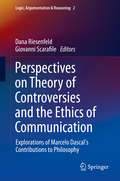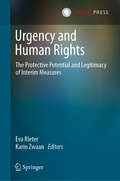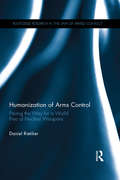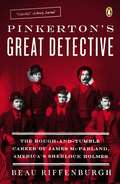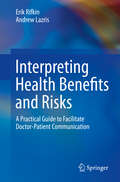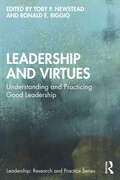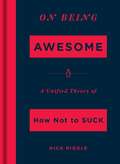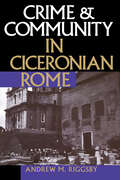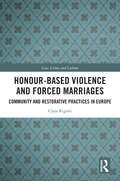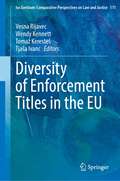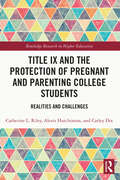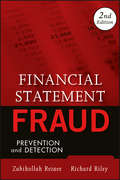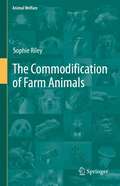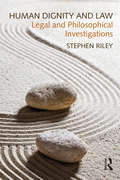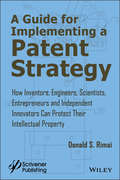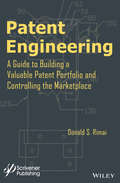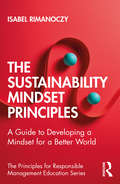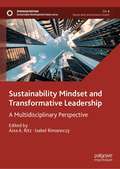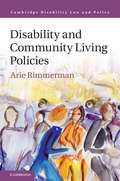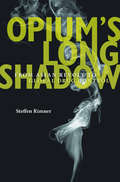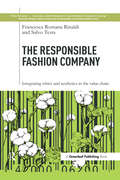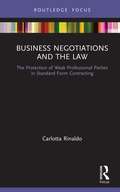- Table View
- List View
Perspectives on Theory of Controversies and the Ethics of Communication
by Dana Riesenfeld Giovanni ScarafileAssembling an unprecedented range of considered responses to the noted contributions to philosophy made by Marcelo Dascal, this collection comprises the work of his many friends, colleagues and former students. Beginning with a series of articles on Dascal's influential insights on philosophical controversy, this volume continues with explorations of Dascal's celebrated scholarship on Liebnitz, before moving on to papers dealing with his philosophy of language, including interpretations by Dresner and Herring on the phenomenon of emoticons. Taken as a whole, they provide a compelling commentary on Dascal's prolific and voluminous publications and include fresh perspectives on the theory of argumentation and the ethics of communication. The material collected here extends to political philosophy, such as Morris-Reich's paper exploring the ways in which German social scientists confront issues of antisemitism, the psychology of genius, and the origins of norms in society and culture. Much of the analysis is directly connected to, or influenced by, the philosophical themes, ideas and concepts developed throughout the years by Marcelo Dascal, while others have a looser connection to his work. All of them, however, attest to the remarkable and multifaceted philosophical persona of Marcelo Dascal, who is the guiding light of the rich conceptual dialogue running through this book.
Urgency and Human Rights: The Protective Potential and Legitimacy of Interim Measures
by Eva Rieter Karin ZwaanThis book deals with urgency and human rights. ‘Urgent’ is a word often used, in very different contexts. Yet together with a reference to human rights violations, it likely triggers images of people caught up in armed conflict, facing terror from either the state, gangs, paramilitaries, or terrorists. Or of people fleeing terror and facing walls, fences or seas, at risk of being returned to terror, or ignored, neglected, abused, deprived of access to justice and basic facilities, facing death, torture and cruel treatment. Here these both ongoing and expected violations are explored in the context of (quasi-)judicial proceedings as international tribunals and domestic courts are increasingly called upon to order interim measures or accelerate proceedings in such cases. This edited volume concerns the protective potential of interim measures in international human rights cases and the legitimacy of their use and discusses obstacles to their persuasive use, to clarify how their legitimacy and protective potential could be enhanced in the context of concrete legal cases. Examining this is especially pressing when courts and (quasi-)judicial bodies have used interim measures in response to requests by individuals and organisations in the context of issues that are unpopular with governments and/or controversial within society, which has led states to at times employ political pressure to limit their use. Urgency and human rights are discussed from the vantage point of various practitioners and scholars, with the aim of identifying how interim measures could be legitimate and protective and to single out obstacles to their implementation. Drawing from practices developed in various international and regional adjudicatory systems, the contributors provide their perspectives on the legitimacy and/or the protective potential of interim measures and other (quasi-)judicial proceedings in urgent human rights cases. There is considerable discussion about how interim measures can be legitimate and well-functioning tools to address urgent human rights cases. This book aims to contribute to the ongoing discussion in this respect. Dr. Eva Rieter is senior researcher and lecturer public international law and human rights law at the Centre for State and Law, Radboud University, Nijmegen, The Netherlands. Dr. Karin Zwaan is associate professor in the Department of Migration Law at the Centre for State and Law, Radboud University, Nijmegen, The Netherlands.
Humanization of Arms Control: Paving the Way for a World free of Nuclear Weapons (Routledge Research in the Law of Armed Conflict)
by Daniel RietikerDespite clear legal rules and political commitments, no significant progress has been made in nuclear disarmament for two decades. Moreover, not even the use of these weapons has been banned to date. New ideas and strategies are therefore necessary. The author explores an alternative approach to arms control focusing on the human dimension rather than on States’ security: "humanization" of arms control! The book explores the preparatory work on arms control treaties and in particular the role of civil society. It analyzes the positive experiences of the movements against chemical weapons, anti-personnel mines, and cluster munitions, as well as the recent conclusion of the Arms Trade Treaty. The author examines the question of whether civil society will be able to replicate the success strategies that have been used, in particular, in the field of anti-personnel mines (Ottawa Convention) and cluster munitions (Oslo Convention) in the nuclear weapons field. Is there any reason why the most destructive weapons should not be outlawed by a legally binding instrument? The book also explains the effects of weapons, especially nuclear weapons, on human beings, the environment, and global development, thereby focusing on vulnerable groups, such as indigenous peoples, women, and children. It takes a broad approach to human rights, including economic, social, and cultural rights. The author concludes that the use of nuclear weapons is illegal under international humanitarian and human rights law and, moreover, constitutes international crimes under the Rome Statute of the International Criminal Court. In his general conclusions, the author makes concrete proposals for the progress toward a world without nuclear weapons.
Pinkerton's Great Detective: The Rough-and-Tumble Career of James McParland, America's Sherlock Holmes
by Beau RiffenburghThe story of the legendary Pinkerton detective who took down the Molly Maguires and the Wild BunchThe operatives of the Pinkerton's National Detective Agency were renowned for their skills of subterfuge, infiltration, and investigation, none more so than James McParland.<P><P> So thrilling were McParland's cases that Sir Arthur Conan Doyle included the cunning detective in a story along with Sherlock Holmes.Riffenburgh digs deep into the recently released Pinkerton archives to present the first biography of McParland and the agency's cloak-and-dagger methods. Both action packed and meticulously researched, Pinkerton's Great Detective brings readers along on McParland's most challenging cases: from young McParland's infiltration of the murderous Molly Maguires gang in the case that launched his career to his hunt for the notorious Butch Cassidy and the Wild Bunch to his controversial investigation of the Western Federation of Mines in the assassination of Idaho's former governor.Filled with outlaws and criminals, detectives and lawmen, Pinkerton's Great Detective shines a light upon the celebrated secretive agency and its premier sleuth.
Interpreting Health Benefits and Risks
by Erik Rifkin Andrew LazrisThis timely guide to communication in patient-centered medicine argues for greater clarity in explaining health risks versus benefits of an array of screening tests, procedures, and drug regimens. It reviews the growing trend toward patients' involvement in their own care, particularly in terms of chronic conditions, and details approaches physicians can use to prepare patients (and themselves) for collaborative decision-making based on informed choices and clear, meaningful knowledge. Chapters apply this lens to a wide range of common interventions as contentious as estrogen replacement therapy and antibiotics, and as widely prescribed as the daily aspirin and the annual physical. With this goal in mind, the authors also introduce an innovative decision-making tool that translates risks and benefits into a clear graphic format for fewer chances of miscommunication or misunderstanding. Among the topics covered: Involving the patient in decision making. Towards a universal decision aid. BRCT: the Benefit/Risk Characterization Theater. Breast Cancer Screening--Mammograms. Prostate Cancer Screening. Colon cancer screening with colonoscopy. Screening for and treating dementia. Statins, cholesterol, and coronary heart disease. Physicians in family and internal medicine will find Interpreting Health Benefits and Risks: A Practical Guide to Facilitate Doctor- Patient Communication a valuable resource for communicating with patients and new possibilities for working toward their better health and health education. This book considers several common and important situations where faulty decision-making makes overtreatment a serious risk. Clear, fair, referenced, and useful information is provided. And a powerful intuitive technique is introduced which allows patient and doctor to talk as equals as they work together in the exam room. The authors emphasize that some patients who have been fully educated will still accept high risks of harm for a small chance of avoiding premature death. But as this book is accepted and its ideas and technique are extended, I feel sure that net harm to patients will be curtailed. And what is more, the integrity of the decision-making process will be improved. --Thomas Finucane, MD, Professor of Medicine, Division of Gerontology and Geriatric Medicine, The Johns Hopkins University School of Medicine
Leadership and Virtues: Understanding and Practicing Good Leadership (Leadership: Research and Practice)
by Ronald E. RiggioGood leadership is something every leader and organization should strive towards. This book serves as a pivotal resource in encouraging the understanding and practice of leadership and highlights how good leadership is anchored in the rich philosophy and science of virtue. Through a diverse range of perspectives, the book highlights the importance of leading with virtue, unpacks what it means to be a virtuous leader, and outlines practical strategies for developing and practicing good leadership. Taking a virtues perspective, this cohesive collection of chapters by scholars from around the globe offers an inclusive tone and speaks to practicing and aspiring leaders worldwide. Readers are provided with a nuanced account of the nature of virtues and leadership and how the two interact on multiple levels and in multiple ways to inform the practice of good leadership. Focusing on the tradition of virtue gives this collection a robust scholarly foundation, while simultaneously providing scope for diverse views on how and why virtues inform good leadership. The book offers a balance of scholarly and practice-oriented chapters, instilling readers with a deep understanding of virtues and leadership, and practical strategies to develop their practice of good and virtuous leadership. Each chapter offers a different moral and sociological insight, serving altogether to show readers the most effective ways to use virtues to promote shared well-being and collective success. Scholars, students of leadership and management, and leadership practitioners will benefit from the accessible and practical lessons this book has to offer. This volume will also be of interest to team leaders and managers who are keen to develop their leadership skills in both practice and theory.
On Being Awesome: A Unified Theory of How Not to Suck
by Nick RiggleIn this lively treatise, pro-skater-turned-philosopher Nick Riggle presents a theory of awesomeness (and its opposite, suckiness) that’s both sharply illuminating and more timely than ever “Nick Riggle’s fun book is ‘awesome’ by its own definition. But don’t miss its profound ambition, which is to show how philosophy unearths the structure of ordinary language, defines the meaning of life in routine business, and poses the question of how best to live.” —Aaron James, author of Assholes: A Theory We all know people who are awesome and people who suck, but what do we really mean by these terms? Have you ever been chill or game? Do you rock or rule? If so, then you’re tapped into the ethics of awesomeness. Awesome people excel at creating social openings that encourage expressions of individuality and create community. And if you’re a cheapskate, self-promoter, killjoy, or douchebag, you’re the type of person who shuts social openings down. Put more simply: You suck. From street art to folk singers, Proust to the great etiquette writer Emily Post, President Obama to former Los Angeles Dodger Glenn Burke, Riggle draws on pop culture, politics, history, and sports to explore the origins of awesome, and delves into the nuances of what it means to suck and why it’s so important to strive for awesomeness. An accessible and entertaining lens for navigating the ethics of our time, On Being Awesome provides a new and inspiring framework for understanding ourselves and creating meaningful connections in our everyday lives.
Roman Law and the Legal World of the Romans
by Andrew M. RiggsbyIn this book, Andrew Riggsby offers a survey of the main areas of Roman law, both substantive and procedural, and how the legal world interacted with the rest of Roman life. Emphasising basic concepts, he recounts its historical development and focuses in particular on the later Republic and early centuries of the Roman Empire. The volume is designed as an introductory work, with brief chapters that will be accessible to college students with little knowledge of legal matters or Roman antiquity. The text is also free of technical language and Latin terminology. It can be used in courses on Roman law, Roman history, or comparative law, but it will also serve as a useful reference for more advanced students and scholars.
Crime and Community in Ciceronian Rome
by Riggsby Andrew M.Through the lens of Cicero's forensic oratory, Riggsby examines the four major public offenses: ambitus (bribery of the electorate), de sicariis et veneficiis (murder), vis (riot), and repetundae (extortion by provincial administrators). He persuasively argues that each of these offenses involves a violation of the proper relations between the state and the people, as interpreted by orators and juries. He concludes that in the late Roman Republic the only crimes were political crimes.
Cambridge International Trade and Economic Law: Optimal Regulation and the Law of International Trade
by Boris RigodAre the limitations imposed on World Trade Organization (WTO) members' right to regulate efficient? This is a question that is only scarcely, if ever, analysed in existing literature. Boris Rigod aims to provide an answer to this fundamental concern. Using the tools of economic analysis and in particular the concept of economic efficiency as a benchmark, the author states that domestic regulatory measures should only be subject to scrutiny by WTO bodies when they cause negative international externalities through terms of trade manipulations. He then suggests that WTO law, applied by the WTO judiciary can prevent WTO members from attaining optimal levels of regulation. By applying a law and economics methodology, Rigod provides an innovative solution to the problem of how to reconcile members' regulatory autonomy and WTO rules as well as offering a novel analytical framework for assessing domestic regulations in the light of WTO law.
Honour-Based Violence and Forced Marriages: Community and Restorative Practices in Europe (Law, Crime and Culture)
by Clara RigoniIn the last 20 years, the related phenomena of honour-based violence and forced marriages have received increasing attention at the international and European level. Punitive responses towards this type of violence have been adopted, including ad hoc criminalisation and legislation containing direct references to the concepts of honour, culture, and tradition. However, criminal law-based responses present several shortcomings and have often disregarded the specific needs that victims of such crimes might encounter. This book examines the possibility of using alternative programmes to address cases of honour-based violence and forced marriages. After reviewing previous existing literature, it presents new empirical data. Introducing a case study from the United Kingdom, the book recalls the debate on Sharia Councils and the Muslim Arbitration Tribunal, but examines instead other community-based secular programmes. By comparison, a study from Norway on the work of the National Mediation Agency and the so-called Cross-Cultural Transformative Mediation model is investigated as part of a larger multi-agency approach. Ultimately, in an attempt to reconcile pluralism and the rule of law, the book proposes effective ways to tackle honour crimes based on cooperation and individualisation of the proceedings, and capable of improving women’s access to justice and reducing secondary victimisation. The book will be essential reading for researchers and academics in Law, Criminology, Sociology, and Anthropology and for policy-makers and practitioners working with honour-based violence cases.
Diversity of Enforcement Titles in the EU (Ius Gentium: Comparative Perspectives on Law and Justice #111)
by Vesna Rijavec Wendy Kennett Tomaž Keresteš Tjaša IvancThis book examines the diversity of enforcement titles in cross-border debt collection, focusing on the types, structure, contents and effects of enforcement titles. It offers a comprehensive overview of judgments, court settlements and authentic instruments from a variety of EU Member States. It primarily employs the comparative legal method to draw conclusions on commonalities and differences, as well as prospects for future approximation of laws. The premise of the research is rooted in the finding that national authorities of EU Member States continue to treat enforcement titles from other Member States with reservations and mistrust despite being committed to the principle of mutual trust. The book identifies the issues of mistrust stemming from the diversity of enforcement titles. The research is based on a rich database of national reports compiled during the course of several large-scale EU Justice Projects. Divided into five parts, the book offers first some general considerations and presents attempts at a systemisation of enforcement titles. The following parts are then devoted to more specialised approaches toward the different types of enforcement titles. However, the connecting line between all parts of the book are the considerations of cross-border enforcement in the EU (and in a limited manner with third States). Herein, research also addresses critical factors regarding the free movement of judgments in the EU, including those of lis pendens and related actions. This book provides a valuable contribution to the Theory of European Civil Procedure. Since it is based on a comparative approach and employs both empirical and doctrinal viewpoints, it should also greatly benefit practitioners involved in cross-border dispute resolution. Overall, the findings should be of interest to a broad audience, including policymakers, judges, practitioners and scholars.
Title IX and the Protection of Pregnant and Parenting College Students: Realities and Challenges (Routledge Research in Higher Education)
by Catherine L. Riley Alexis Hutchinson Carley DixThis book explores the discrepancies among what protections Title IX provides to pregnant and parenting students, what colleges communicate, and what pregnant and parenting students actually experience. To actually protect pregnant and parenting students, the authors argue that a school must provide multifaceted support that is effectively communicated to an entire campus community, including students who are parenting, who are pregnant, and who may become pregnant. The first part of the book portrays the realities of pregnancy and parenting in college. The chapters illuminate related Title IX applications, population demographics, how unplanned pregnancies in college occur, and physical and mental health challenges that these students often experience. The authors then discuss what compliance with Title IX legally entails and why meeting it is often an afterthought. In the second half of the book, the authors use mixed-methods research to map the compliance landscapes of three schools in the southeast as examples: a large state school, a mid-size private university, and a small private college. Offering eye-opening interviews with pregnant and parenting students, interdisciplinary research, and proposals for multifaceted support and communication on college campuses, this volume will engage students, scholars, and activists with an interest in higher education administration, educational policy, reproductive health, bioethics, gender studies, and rhetoric.
Financial Statement Fraud
by Richard Riley Zabihollah RezaeePractical examples, sample reports, best practices and recommendations to help you deter, detect, and prevent financial statement fraudFinancial statement fraud (FSF) continues to be a major challenge for organizations worldwide. Financial Statement Fraud: Prevention and Detection, Second Edition is a superior reference providing you with an up-to-date understanding of financial statement fraud, including its deterrence, prevention, and early detection.You will findA clear description of roles and responsibilities of all those involved in corporate governance and the financial reporting process to improve the quality, reliability and transparency of financial information.Sample reports, examples, and documents that promote a real-world understanding of incentives, opportunities, and rationalizationsEmerging corporate governance reforms in the post-SOX era, including provisions of the SOX Act, global regulations and best practices, ethical considerations, and corporate governance principlesPractical examples and real-world "how did this happen" discussions that provide valuable insight for corporate directors and executives, auditors, managers, supervisory personnel and other professionals saddled with anti-fraud responsibilitiesExpert advice from the author of Corporate Governance and Ethics and coauthor of the forthcoming Wiley textbook, White Collar Crime, Fraud Examination and Financial ForensicsFinancial Statement Fraud, Second Edition contains recommendations from the SEC Advisory Committee to reduce the complexity of the financial reporting process and improving the quality of financial reports.
The Commodification of Farm Animals (Animal Welfare #21)
by Sophie RileyThis book examines how the developments in veterinary science, philosophy, economics and law converged during the nineteenth and early twentieth centuries to entrench farm animals along a commodification pathway. It covers two neglected areas of study; the importance of international veterinary conferences to domestic regimes and the influence of early global treaties that dealt with animal health on domestic quarantine measures. The author concludes by arguing that society needs to reconsider its understanding and the place of the welfare paradigm in animal production systems. As it presently stands, this paradigm can be used to justify almost any self-serving reason to abrogate ethical principles.The topic of this book will appeal to a wide readership; not only scholars, students and educators but also people involved in animal production, interested parties and experts in the animal welfare and animal rights sector, as well as policy-makers and regulators, who will find this work informative and thought-provoking.
Human Dignity and Law: Legal and Philosophical Investigations
by Stephen RileyThis book argues that human dignity and law stand in a privileged relationship with one another. Law must be understood as limited by the demands made by human dignity. Conversely, human dignity cannot be properly understood without clarifying its interaction with legal institutions and legal practices. This is not, then, a survey of the uses of human dignity in law; it is a rethinking of human dignity in relation to our principles of social governance. The result is a revisionist account of human dignity and law, one focused less on the use of human dignity in our regulations and more on its constitutive implications for the governance of the public realm.The first part conducts a wide-ranging moral, legal and political analysis of the nature and functions of human dignity. The second part applies that analysis to three fields of legal regulation: international law, transnational law, and domestic public law.The book will appeal to scholars in both philosophy and law. It will also be of interest to political theorists, particularly those working within the liberal tradition or those concerned with institutional design.
A Guide for Implementing a Patent Strategy: How Inventors, Engineers, Scientists, Entrepreneurs, and Independent Innovators Can Protect Their Intellectual Property
by Donald S. RimaiThis book is aimed at the innovators who drive the advances from which we all benefit. This includes scientists, engineers, technicians, managers, and entrepreneurs who want to financially benefit from their innovations. The book describes how to build patent portfolios that will properly protect your technology and be of financial benefit. The tools that innovators need to have to generate patents are presented in detail.
Patent Engineering: A Guide to Building a Valuable Patent Portfolio and Controlling the Marketplace
by Donald S. RimaiPatents are a vital asset in the modern business world. They allow patent holders to introduce new products in to a market while deterring other market players from simply copying innovative features without making comparable investments in research and development. In years past, a few patents may have provided adequate protection. That is no longer the case. In today's world, it is critical that innovative companies protect the features of their products that give them a competitive advantage with a family or portfolio of patents that are strategically generated to protect the market position of the patent holder. A patent portfolio that deters competitors from introducing competitive products in a timely manner can be worth billions of dollars. Anything less than this is an expensive and possibly fatal distraction. This book provides a strategic framework for cost efficient engineering of patent portfolios that protect your investments in research and development and that extend the market advantages that these investments provide.
The Sustainability Mindset Principles: A Guide to Developing a Mindset for a Better World (The Principles for Responsible Management Education Series)
by Isabel RimanoczyAs we increase our awareness of the planetary challenges and how they intersect with the discipline or profession we choose to focus on, we have put our attention on the external forces and impacts. What remains untouched however is the set of beliefs, values, assumptions, mental processes, and paradigms that we hold and share: our mindset. But how do we change a mindset? This book is the first to introduce the 12 Principles for a Sustainability Mindset, presenting educators with a framework that makes it easy to include them into teaching plans and lessons of any discipline. Written in a very clear and practical way, the book provides examples, checklists, tips, and tools for professionals and educators. It transforms the development of a much-needed mindset for sustainability into an accessible, fun and intuitive task. The book is written with educators from a variety of disciplines in mind, including but not limited to management educators, coaches, and trainers. No other book comes close to providing such a well-organized and solid way of starting to shift our mindsets in the direction of sustainability.
Sustainability Mindset and Transformative Leadership: A Multidisciplinary Perspective (Sustainable Development Goals Series)
by Isabel Rimanoczy Aixa A. RitzThis volume examines the importance of leadership in developing an effective sustainability strategy. It defines the sustainability mindset and surveys the primary motivations, conditions, or environment(s) that cause leaders to embrace sustainable practices. As described in the UN Sustainable Development Goal 8, embracing the sustainability mindset will lead to greater productivity and promote economic growth.Organized into themes of organizational operations, leadership competencies, and leadership practices, the chapters, written by contributors representing global perspectives, tackle topics such as strategy, culture, and leadership styles in developing a new form of mindfulness for leaders as well as organizations. Recognizing the need for accelerated change in organizations as well as society at large, this book presents scholars with a framework for establishing a mindset for sustainability to foster much-needed transformative leadership.
Intellectual Property and Clean Energy: The Paris Agreement and Climate Justice
by Matthew RimmerThis collection considers the future of climate innovation after the Paris Agreement. It analyses the debate over intellectual property and climate change in a range of forums – including the climate talks, the World Trade Organization, and the World Intellectual Property Organization, as well as multilateral institutions dealing with food, health, and biodiversity. The book investigates the critical role patent law plays in providing incentives for renewable energy and access to critical inventions for the greater public good, as well as plant breeders’ rights and their impact upon food security and climate change. Also considered is how access to genetic resources raises questions about biodiversity and climate change. This collection also explores the significant impact of trademark law in terms of green trademarks, eco labels, and greenwashing. The key role played by copyright law in respect of access to environmental information is also considered. The book also looks at deadlocks in the debate over intellectual property and climate change, and provides theoretical, policy, and practical solutions to overcome such impasses.
Disability and Community Living Policies (Cambridge Disability Law and Policy Series)
by Arie RimmermanThis book provides a comprehensive analysis of the roots of institutionalization, deinstitutionalization legislation and policies of the twentieth century, and twenty-first-century efforts to promote community living policies domestically and internationally, particularly through the role of the United Nations Convention on the Rights of Persons with Disabilities (UNCRPD), a landmark treaty adopted on 13 December 2006. Rimmerman shows that deinstitutionalization and community living cannot be examined only in terms of the number of institutions closed but also through the substantial change in values, legislation, and policies supporting personalization, as well as the social participation of people with disabilities. The book includes a significant exploration of United States legislation and important Supreme Court decisions compared with European policies toward community living. Finally it discusses the importance of Articles 12 and 19 of the convention and demonstrates the case of Israel that has used the convention as a road map for proposing a new community living policy. Provides insightful views of the shift from institutionalization to human rights approaches Demonstrates how Articles 12 and 19 of the UN convention can be implemented at national level Analyzes the differences between European and United States policies toward community living
Opium’s Long Shadow: From Asian Revolt to Global Drug Control
by Steffen RimnerIn 1920 the League of Nations Advisory Committee on the Traffic in Opium and Other Dangerous Drugs captured eight decades of political turmoil over opium trafficking. Steffen Rimner shows how local protests crossed imperial, national, and colonial boundaries to harness naming and shaming in international politics—a deterrent that continues today.
The Responsible Fashion Company: Integrating Ethics and Aesthetics in the Value Chain
by Francesca Romana Rinaldi Salvo TestaIn The Responsible Fashion Company, Rinaldi and Testa argue that the fashion industry is at a crossroads: the need for a global shift to a sustainable model has never been more urgent. Yet, they demonstrate that we are witnessing a revolution led by conscious consumers and enlightened companies, who are redefining the rules of the fashion market. The question is: when will the rest of the industry catch up? Rinaldi and Testa raise a fundamental but often neglected issue in the fashion sustainability debate: long-term equilibrium can only be achieved by integrating economic goals with environmental, social and ethical values. "The Responsible Fashion Company" provides a clear overview of the theory, challenges and opportunities of sustainability in the industry and demonstrates how fashion companies can achieve competitive advantage through sustainable innovation. The authors show how leading fashion companies are challenging traditional thinking and present inspiring examples from pioneers such as Gucci, Levi's, Timberland and Brunello Cucinelli, who create quality products without leaving a negative impact behind.Refreshing and timely, The Responsible Fashion Company is essential reading for the socially conscious consumer and anyone with a professional or personal interest in the fashion, design and luxury industries.
Business Negotiations and the Law: The Protection of Weak Professional Parties in Standard Form Contracting (Young Feltrinelli Prize in the Moral Sciences)
by Carlotta RinaldoBusiness Negotiations and the Law: The Protection of Weak Professional Parties in Standard Form Contracting aims to explore the issues surrounding contract negotiations between entrepreneurs and other professionals when one of the parties does not have the same level of bargaining power as the other. The need to protect weaker parties from unfair contract terms exists not only in relationships between businesses and consumers, but in business to business contracts also. This book focuses on the problem of small enterprises, independent contractors and other professional weak parties and examines these from a European point of view. There are significant differences between Member States as to decisions regarding regulatory context on the protection of weaker professional parties in asymmetrical contractual situations. However, European businesses are overwhelmingly smaller in size, so protecting weaker parties becomes key in facilitating successful and efficient negotiations. The book provides a critical and comparative overview of the area and recent regulatory developments, both to clarify the direction that European legislation is heading, and to explore the tools needed to assure the effectiveness of the common market. This text will be of interest to policy makers, researchers of European legislation, and students of commercial and business law.
